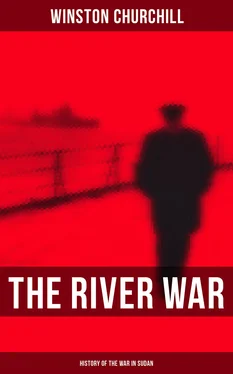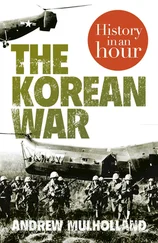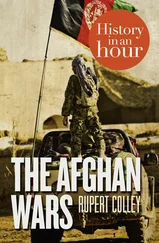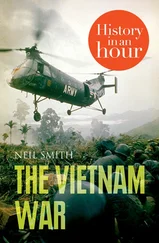It now became necessary to divide the small force. Some must remain to guard the baggage and the wounded; the others must fight their way to the water. At three o'clock in the afternoon of the 19th, 900 men left the hastily made zeriba and marched towards the river. Without their camels or those of the transport they appeared insignificant, a mere speck on the broad plain of Metemma. The Dervishes hastened to clinch the matter.
The square advances slowly and painfully over the stony ground, with frequent jerky halts to preserve order and to pick up the wounded. Little puffs of white smoke dot the distant sandhills. Here and there a gaudy flag waves defiantly. In front the green tops of the palm-trees by the Nile tantalise but stimulate the soldiers. On the left the great mud labyrinth of Metemma stretches indefinitely. Suddenly the firing stops. The low scrub in front is alive with the swarming figures of the enemy. All the flags dance forward together. Ragged white figures spring up in hundreds. Emirs on horses appear as if by magic. Everywhere are men running swiftly forward, waving their spears and calling upon the Prophet of God to speed their enterprise. The square halts. The weary men begin to fire with thoughtful care, The Dervishes drop thickly. On then, children of the desert! you are so many, they are so few. They are worn with fatigue and their throats are parched. You have drunk deeply of the Nile. One rush will trample the accursed under the feet of the faithful. The charge continues. A bugle sounds in the waiting square. The firing stops. What is this? They lose heart. Their ammunition is exhausted. On, then, and make an end. Again the smoke ripples along the line of bayonets and fire is re-opened, this time at closer range and with far greater effect. The stubborn grandeur of the British soldier is displayed by desperate circumstances. The men shoot to hit. The attack crumples. The Emirs—horse and man—collapse. The others turn and walk—for they will not run—sullenly back towards the town. The square starts forward. The road to the river is open. With dusk the water is reached, and never have victors gained a more longed-for prize. The Nile is won. Gordon remains.
Sir Charles Wilson, having collected his force, remained three days by the bank of the Nile before attempting any further advance on Khartoum. He has explained why this delay was necessary, to the satisfaction of most military critics. Nor is it easy to believe that men who had made such splendid efforts would have willingly lost a single moment. On the fourth day he embarked on two of Gordon's steamers, which awaited the relieving column, and taking with him twenty British soldiers and a few blue-jackets set forth towards the Shabluka Gorge and the town that lay beyond. On the 27th of January the rescuers came in sight of Khartoum and under the fire of the enemy. Many of their perilous adventures seem to belong to romance rather than to reality: the tiny gimcrack boats struggling with the strong stream of the cataract, running the gauntlet of the Arab guns, dropping disconsolately down the river with their terrible news, or wrecked and stranded on the sandbank; Stuart-Wortley rowing to the camp before Metemma for help; Beresford starting in the remaining steamer; the bursting of the boiler by a Dervish shell; Benbow mending it in a single day; Wilson's rescue and the return to the entrenchment at Gubat. But the scene that appeals to the imagination above all the others is that where with both banks ablaze with musketry and artillery, the black smoke pouring through the shot-holes in the funnels, the water rising in spurts from the bullets, the men who had come so far and braved so much stared at the palace roof and, seeing no flag flying, knew that all was over and that they had come too late.
The news of the Dervish defeats at Abu Klea and Abu Kru impelled the Mahdi to a desperate venture. The English were but 120 miles away. They were few, but victorious. It was difficult to say what force could stop such men. In spite of the wrath of the true God and the valour of Islam they might prevail. The Mahdi depended on success for existence. The tremendous forces of fanaticism are exerted only in a forward direction. Retreat meant ruin. All must be staked on an immediate assault. And, besides, the moment was ripe. Thus the Arab chiefs reasoned, and wisely resolved to be reckless. Thus the night of the 25th of January arrived.
The band played as usual in the evening. Gradually the shadows fell and it became dark. The hungry inhabitants betook themselves to bed. The anxious but indomitable commander knew that the crisis impended, and knew also that he was powerless to avert it. Perhaps he slept, satisfied that he had done his duty; and in the silence of the night the savage enemy crawled stealthily towards the town. The weary and disheartened sentinels, weakened by famine and tired of war, maintained a doubtful vigilance along the ramparts. The subsiding waters of the river had left a bare gap between the White Nile and the wall. Perhaps there was treachery besides. On a sudden the loud explosion of musketry broke the stillness of the night and the slumbers of the people; and with a continual shouting thousands of Dervishes swarmed through the unprotected space and entered Khartoum.
One mob of assailants made their way to the palace. Gordon came out to meet them. The whole courtyard was filled with wild, harlequin figures and sharp, glittering blades. He attempted a parley. 'Where is your master, the Mahdi?' He knew his influence over native races. Perhaps he hoped to save the lives of some of the inhabitants. Perhaps in that supreme moment imagination flashed another picture before his eyes; and he saw himself confronted with the false prophet of a false religion, confronted with the European prisoners who had 'denied their Lord,' offered the choice of death or the Koran; saw himself facing that savage circle with a fanaticism equal to, and a courage greater than, their own; marching in all the pride of faith 'and with retorted scorn' to a martyr's death.
It was not to be. Mad with the joy of victory and religious frenzy, they rushed upon him and, while he disdained even to fire his revolver, stabbed him in many places. The body fell down the steps and lay—a twisted heap—at the foot. There it was decapitated. The head was carried to the Mahdi. The trunk was stabbed again and again by the infuriated creatures, till nothing but a shapeless bundle of torn flesh and bloody rags remained of what had been a great and famous man and the envoy of her Britannic Majesty. The blood soaked into the ground, and left a dark stain which was not immediately effaced. Slatin mentions that the Arabs used often to visit the place. Ohrwalder went himself, and more than six weeks after the capture of the town, saw 'black spots' upon the steps. But they have all since been obliterated.
Such, briefly, is the story of the fall of Khartoum and of the death of Gordon. The fact that the two steamers arrived only two days after the capture of the town has given colour to the belief that, but for the three days' delay at Metemma, the catastrophe might have been averted. This view appears incorrect. The Arabs had long held Khartoum at their mercy. They hoped, indeed, to compel its surrender by famine and to avoid an assault, which after their experience at El Obeid they knew must cost them dear. Gordon has stated in his Journals that the town became defenceless by the middle of December. The arrival of twenty British soldiers and a few officers could not have materially affected the situation—could only, in fact, have increased the loss. Yet nearly everyone who reads the tale will wish—in spite of reason—that some help, however little, had reached the lonely man; that before the darkness fell he had grasped an English hand, and learned that his countrymen had not abandoned him, had not forgotten—would never forget.
Читать дальше












